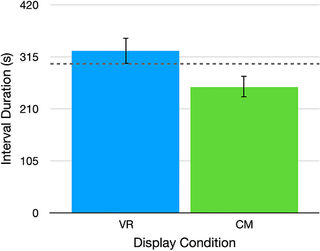Environment
Do You Experience Time Differently in VR?
New research reveals the unique time-warping effects of virtual reality.
Posted May 31, 2021 Reviewed by Davia Sills
Key points
- Virtual reality (VR) users anecdotally report that time passes faster than they think.
- New research confirms that playing a game in VR causes perceptual "time compression" compared to playing the same game on a regular monitor.
- Time compression in VR brings potential benefits and risks, and studying it also reveals possible mechanisms of time-keeping in the human brain.
Virtual Reality (VR) technology is quickly becoming better, cheaper, and more popular. Beyond its popularity in the gaming world, VR researchers have developed fascinating applications for sports, medicine, and clinical psychology. However, there remains a potentially hidden dark side of VR when it comes to our perception and management of time.
Anecdotally, users have reported something called time compression when using VR. After playing a VR game, a user might take off the headset and have a strange feeling that they don't know how long they've been there. When confronted with reality, they will often report that their experience in VR felt much shorter than it actually was.
Retrospective versus prospective time
Research into time perception has probed this question in two ways: The first approach has looked at retrospective time estimation. In this approach, time judgments are made after the fact: for example, by asking a participant to make an estimate of how long it has been since a certain event happened. These retrospective judgments are largely based on memory and can be influenced by biases in reporting. For example, participants are more likely to round up or down to the nearest minute.
In the second approach, called prospective time estimation, participants are informed ahead of time that they will be keeping track of time while they perform a secondary task. For example, participants may be asked to engage in a task for a prescribed duration of time (e.g., 5 minutes) and indicate when they feel that duration has transpired. In this approach, timekeeping has been shown to be influenced by several variables, including attention, the richness of the environment, the emotions one is feeling, and more. Although a handful of studies previously reported time compression effects in VR, no study had directly compared time compression in VR to an otherwise identical experience using a conventional monitor (CM).
A new experiment
Grayson Mullen was an undergraduate Cognitive Science major at UC Santa Cruz working in my research lab when he proposed a senior project to investigate this question: Does VR cause time compression over and beyond a similar experience using a conventional monitor? To do it, he designed a maze-like game where users manipulate a maze in different directions to guide a ball to its destination. The key element of the game is that it looks and feels practically identical in VR and on a CM, even using the same controls.
We recruited 41 participants from UC Santa Cruz who were novices in VR and asked them to play the two versions of the game, counterbalancing which version they played first. As participants played the game, they were frequently reminded that they should indicate when 5 minutes had passed since the beginning of the game—a prospective judgment.

Our analysis revealed two outlier participants, so the results are based on the remaining 39 participants—19 who played in VR first and 20 who played on a CM first. The graph to the left shows the results for the first block of the experience. Intervals produced in VR were on average 28 percent longer than on a CM, confirming the time compression effect.
Surprisingly, in the second block, the results did not hold up; in fact, participants produced nearly identical durations as in their first block, only slightly longer (regardless of format). This breakdown of results in the second block speaks to the limitations of the prospective time-keeping methodology—it can't be done twice in a row; otherwise, the second judgments will be largely influenced by the first.
Focusing on the first-block results, our research shows a considerable VR time compression effect, where participants in VR experienced a longer real duration as a shorter perceived duration. Of course, this research leaves many open questions about time compression: Does it hold up for longer or shorter periods of time? Does it show up in VR experts as much as in the novices who participated in our study?
Benefits and risks
As we argue in our new paper, time compression comes with potential benefits as well as possible risks. Among the benefits, time compression can be leveraged to make certain unpleasant experiences, like a chemotherapy session or long-distance travel, seem to pass by faster.
On the other hand, time compression could have negative consequences for individuals who already struggle with gaming addiction. Due to this concern, we recommend VR developers include regular time checks, allowing users to be aware of how much time they are spending in the virtual world.
Looking ahead
As VR technology becomes more ubiquitous, users, researchers, and developers need to be aware of the potential benefits and risks of time compression. Ultimately, the technology will allow researchers to develop further insights into how time perception works in the brain.
Theories of time-keeping suggest we use bodily rhythms, such as heart rate and breathing, as cues to keep track of time. Because VR often excludes a self-body representation, it is possible that the inability to see one's own body in VR makes the user less aware of these bodily rhythms, and therefore less aware of the passage of time. To test this theory, future research might manipulate just the visibility of a user's body to help pinpoint what exactly it is about VR that changes how we experience time.
References
Mullen, G., & Davidenko, N. (2021). Time Compression in Virtual Reality. Timing & Time Perception, 1(aop), 1-16. https://doi.org/10.1163/22134468-bja10034




